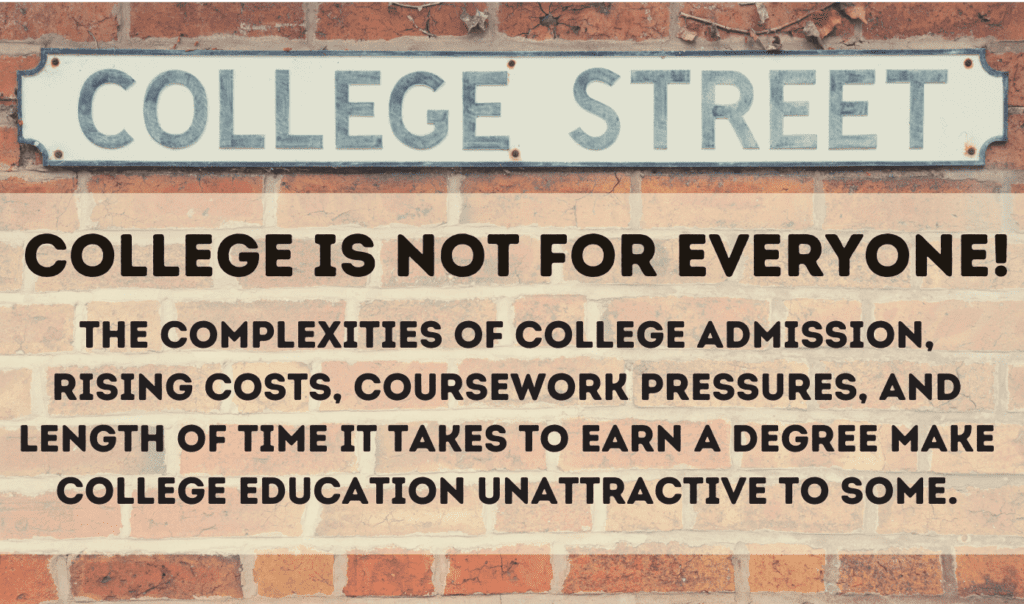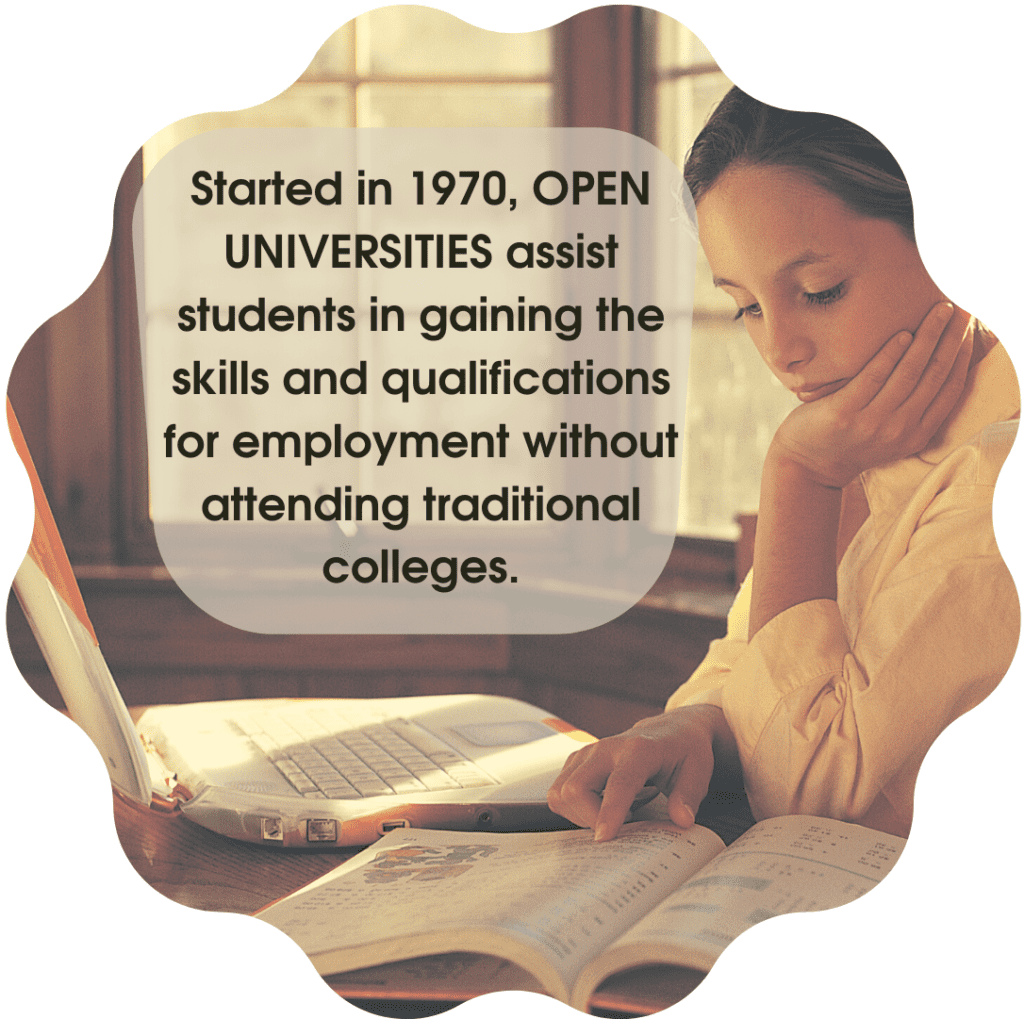Young people are often taught that college should be on top of their list of priorities. Parents strive to send their kids to college, as it is deemed the key to success. And, in many cases, this effort does lead to success. A college degree unlocks a world of opportunities exclusive only to those who have completed one. College students and graduates build a career path, make professional connections, and earn more than high school graduates. There is also a sense of personal fulfillment that comes with earning a college degree from a reputable institution.
But college is not for everyone. The rising college cost along with the accompanying student debt and the length of time it usually takes to complete a degree are some of the reasons why it’s unlikely to attract everyone. Other reasons may include the sometimes necessary delay of buying a house, saving for retirement or starting a family. This list provides ways to make a good income without earning a college degree. These innovative alternatives could also help pay for college down the road!
Here’s another option… Trade Schools! Check out this impressive list: 30 High Paying Trade School Degrees and Jobs 2020

But is it possible to acquire the right skills to land the job of your dreams without having to go to college?
Today, you have the option to try non-traditional training and innovative learning alternatives, as they are just like a college education that equips students with the competencies for future work or a career. By utilizing modern technologies and tools, college alternatives enrich a student’s learning experience and uncover their potential.
We make it clear, however, that just as college is not for everyone, these options may not be right up everyone’s alley. The great thing about college alternatives, though, is that there’s no harm in trying them!
Curious about interesting career opportunities? Check this out: CAREER GUIDES: Salary and Degree Information
Here are the most popular innovative college alternatives to consider:

* Apprenticeships
* Coding Boot Camps
* Massive Open Online Courses (MOOCs)
* Open University
* Foundation Degrees

Apprenticeships

Also known as job-based learning, apprenticeships were initially designed for trade schools that conduct training for plumbers, electricians, machinists, and other trade jobs. They were aimed at meeting the need of different industries for a skilled workforce.
Today, you can do apprenticeships in a wide variety of professions or subjects through paid career-training programs that cover the many disciplines relating to marketing, business administration, and finance. If you want to become an accountant, you can certainly be one without an Accounting degree—thanks to apprenticeship opportunities.
How does an apprenticeship work? All apprenticeship programs have sponsors consisting of single businesses or corporations. Some community colleges also sponsor apprenticeships. Most of these programs require individuals to be at least 18 years old, and the sponsor sets the minimum qualifications for acceptance.
According to the U.S. Department of Labor, a full-proficient worker makes an average of $50,000 annually and $300,000 more during their career after completing their apprenticeship program. A completed apprenticeship program is widely recognized as a feather on your cap by employers across the nation.
Interested in an apprenticeship that enhances your skills? The government provides a full list of apprenticeship programs to help you meet your career objectives.

Coding Boot Camps

Did you know that careers in tech no longer require a full college degree? The country’s top schools offer excellent undergraduate programs focusing on technology and programming. Still, if you’re interested in short, intensive coding programs, a coding boot camp might just be your ticket to that dream career.
Coding boot camps or schools offer a wide variety of courses with a comprehensive curriculum that can run for 8 to 15 weeks. They teach you topics from full-stack web development to digital marketing, data science, UX/UI design, JavaScript, and all else associated with computer systems and technologies. These schools help you start your tech-focused careers without spending a fortune and so much time. You can sign up for the programs for “Full-time, In-person,” “Full-tie Remote,” “Self-paced,” and “Part-time, Career-Focused” boot camps.
If you’ve always wanted to be a developer but are quite unsure about attending university and earning a degree, the coding boot camps might be the right choice for you. These boot camps are a flexible alternative that helps you gain practical skills and hands-on experience, which can get you a job in weeks. The average boot camp cost starts at $12,000 and allows graduates to earn an average annual salary of $70,698. On top of that, 83% of coding boot camp graduates get a full-time job. U.S. tech companies have also been eager to hire coding school graduates.
Here are some of the best coding boot camps across the nation:

Massive Open Online Courses (MOOCs)

Massive Open Online Courses or MOOCs are innovative college alternatives that started in 2012. They are learning classes presented through Coursera, EdX, Thinkful, Udemy, and other platforms. Though MOOCs certificates are not the same as college diplomas, they provide a world-class education to anyone interested. A working computer and access to the Internet are all that’s required. Anyone can enroll as long as hardware requirements are met.
MOOCs are usually free, although some providers charge a small fee. As such, students get the kind of education that they can use for their future careers without breaking the bank.
MOOCs don’t require a particular number of students for the classes to start, and they do not follow the formalized systems of traditional or online learning. Courses are typically self-paced, and students can start or stop at any time they want. MOOCs and online colleges are quite similar, for they both use the same online course materials, engage the services of the same professors, and offer flexible schedules for students. Some MOOCs are offered in partnership with colleges and universities like Harvard and Oxford for subjects focusing on mathematics, the sciences, and the humanities. Unlike structured grading in online colleges, MOOCs generally use automated and peer gradings.
Tangible career benefits such as getting a promotion, finding a new job, and even starting a business are some of the reasons why millions enroll in MOOCs. Upon completion of a program, enrollees earn a certificate or an academic credit that they can use to explore career possibilities.

There are many ways to earn accolades or credits through FREE classes. Read this: 12 Free Online Classes From Harvard and Yale in 2020
Open University

Open universities are also a popular alternative approach to college. Started in 1970, open universities primarily assist students in improving their skills and qualifications without attending traditional colleges.
Open universities offer open admissions, distance learning, and online programs. You can take free courses or pay for tuition, study materials, exams, and certifications. Although some open universities have increased fees, they are still relatively cheaper than traditional universities. Open universities have a few requirements for admission, making it ideal for students who lack the resources and the finances for traditional college application.
Students in an open university may take courses by study centers and institutes. Open universities offer for-credit courses in a wide range of disciplines such as engineering, law, journalism, economics, and many others. Different student levels are awarded different degrees. These include an undergraduate certificate which is equivalent to one-third of a bachelor’s degree, an undergraduate diploma for two-thirds of a bachelor’s degree, a bachelor’s degree without honors which is equal to five-sixth of a bachelor’s degree, and a bachelor’s degree with recognition for a full bachelor’s degree. You can check out FutureLearn, one of the largest platforms founded by Open University.

Foundation Degrees

A Foundation Degree is your opportunity for flexible study while you work. It is the go-to option if you’re not sure about pursuing a college degree but worry about carving out your career.
Foundation degree programs are usually organized by universities in partnership with other colleges and institutions. A foundation degree is two-thirds of a full-honors degree. It focuses on a specific profession and helps you gain practical skills. There are no fixed entry requirements, and full-time students can complete the program in two years. Successful students become well-trained individuals who thrive in the vocational sector with their enhanced technical, management, and cognitive skills.
Although foundation degrees require a certain fee, this innovative alternative to college is usually more affordable than most traditional universities or college programs. You can apply for a foundation degree at UCAS.
Are you interested in earning a graduate degree? If so, you may want to check out this interesting article: 20 Online Graduate Degrees: No GRE Required 2020